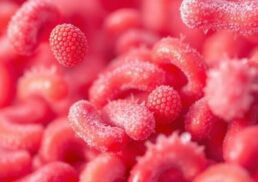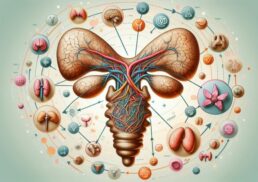Feeling bloated or struggling with digestion issues? Look no further, as the secret to optimal gut health may lie in the world of prebiotics. Unlock the full potential of these powerful plant fibers and discover how they can significantly improve your overall health and well-being.
Table of Contents
Key Takeaways
Prebiotics are plant fibers that nourish healthy gut bacteria and promote overall wellbeing.
Prebiotics support the growth of probiotics in the human gut, providing essential nutrients for balanced microbiome and digestion.
Consuming prebiotic foods can offer numerous health benefits such as immune system enhancement, anti-inflammatory properties, digestive system support, and improved metabolic health.
Understanding Prebiotics: The Basics

Prebiotics are plant fibers that nourish healthy gut bacteria, promoting overall wellbeing and working in tandem with probiotics to enhance gut health. These fibers provide a fertile ground for beneficial bacteria to thrive, which in turn, can lead to various health benefits such as:
immune system support
anti-inflammatory properties
improved digestion
increased nutrient absorption
Integrating prebiotics into your diet is beneficial because they contribute to maintaining
Definition of Prebiotics
In essence, prebiotics are non-digestible fibers that serve as food for probiotics, supporting their growth and function. These fibers, found in foods like yacon root and wheat bran, are not broken down by our digestive system but instead fermented by the bacteria in our gut, thus promoting a healthy balance of gut bacteria.
A healthy human colonic microbiota relies on prebiotics for the vital nutrients it needs.
Prebiotic Functions
Prebiotics play a crucial role in maintaining a healthy balance of gut bacteria by acting as a fertilizer for the microbiome, stimulating the growth and activity of beneficial microorganisms. They enhance digestion and metabolism, regulate intestinal movements, augment calcium absorption, and stimulate the growth of advantageous bacteria in the gut.
Moreover, the fermentation of prebiotics by gut bacteria results in the production of short-chain fatty acids, which have a positive effect on gut health and can ameliorate inflammation. A healthy gut environment is fostered through the synergistic relationship between prebiotics, probiotics, and our gut bacteria.
Relationship between Prebiotics and Probiotics
Prebiotics and probiotics work together to maintain a healthy gut microbiome. Prebiotics act as a source of nourishment for probiotics, facilitating their growth and function, while probiotics are live microorganisms that provide health benefits when consumed in adequate amounts.
The joint efforts of prebiotics and probiotics are foundational for a healthy gut and overall well-being.
Health Benefits of Prebiotics
Prebiotics not only support the growth of beneficial bacteria but also offer a variety of health benefits, including improved digestion, immune system support, and reduced inflammation.
Exploring these benefits further will clarify how prebiotics enhance our overall health by promoting a beneficial physiological effect.
Digestive System Support
Prebiotics are beneficial in sustaining a healthy gut environment by stimulating the growth of beneficial bacteria within the digestive system. This, in turn, can enhance digestion and decrease digestive discomforts like bloating and constipation.
A balanced gut microbiome, pivotal for overall health and reduced risk of digestive disorders, can result from a diet abundant in prebiotic-rich foods. By fostering a healthy digestive system, prebiotics contribute to our overall well-being.
Immune System Enhancement
Prebiotics can have a beneficial effect on the immune system by promoting the production of antibodies and other immune cells. The growth of beneficial bacteria, which prebiotics stimulate, can help reduce inflammation and enhance the body’s capacity to combat infections.
The anti-inflammatory properties of prebiotics further contribute to their immune-boosting effects. Prebiotics fortify our immune system by fostering a healthy gut microbiome and reducing inflammation.
Learn more, visit Impact of prebiotics on immune response.
Anti-inflammatory Properties
Prebiotics have been shown to be effective in decreasing the production of pro-inflammatory molecules, thus reducing inflammation in the body.
Prebiotics may reduce the risk of chronic diseases and improve overall health by fostering a healthy gut environment and mitigating inflammation.
Top Prebiotic Foods to Include in Your Diet

Prebiotic-rich foods include:
Fruits
Vegetables
Whole grains
Legumes
Nuts
Seeds
Incorporating probiotic foods and these other foods into your diet can be a simple and delicious way to support a healthy gut microbiome and unlock the numerous health benefits prebiotics have to offer.
Fruits and Vegetables
Some of the top prebiotic-rich fruits and vegetables include:
Bananas
Apples
Asparagus
Onions
Garlic
These nutrient-dense foods not only provide prebiotic fiber to promote the growth of beneficial gut bacteria but also supply essential vitamins and minerals for overall health.
Whole Grains and Legumes
Barley, oats, and beans are excellent sources of prebiotic fiber. Consuming whole grains and legumes can help nourish your gut bacteria, support healthy digestion, and provide additional health benefits such as improved blood sugar control and weight management.
Nuts and Seeds
Nuts and seeds, like flaxseeds and chia seeds, provide prebiotic fiber and other essential nutrients. Incorporating these nutrient-dense foods into your diet can further support a healthy gut microbiome and promote overall well-being.
How to Incorporate Prebiotics into Your Meals
Incorporating prebiotics into your daily meals can be simple and enjoyable. From breakfast options like oatmeal to lunch and dinner choices like salads and stir-fries, there are countless ways to add these gut-friendly foods to your diet.
Promoting a healthy gut microbiome is possible by adding prebiotics to your meals.
Breakfast Ideas
Kick-start your day with a prebiotic-rich breakfast by enjoying a warm bowl of oatmeal topped with fruit, a creamy yogurt parfait with granola, or a nutrient-packed smoothie with spinach and berries. These delicious options can help you start your day on the right foot and support a healthy gut microbiome.
Beneficial gut bacteria, also known as healthy bacteria or good bacteria, can be nourished by including prebiotic-rich foods in your breakfast.
Lunch and Dinner Options
For lunch and dinner, consider creating vibrant salads with prebiotic-rich vegetables, flavorful stir-fries with onions and garlic, or hearty whole grain pasta dishes. These nutritious options can help you incorporate prebiotics into your meals while also providing a variety of flavors and textures to keep your taste buds satisfied.
Snack Time Choices
Snack time is another opportunity to enjoy prebiotic-rich foods. Satisfy your cravings with yogurt topped with fruit, nuts, or seeds, or indulge in a simple yet satisfying banana with peanut butter.
These wholesome snacks, containing human milk oligosaccharides, can help support a healthy gut microbiome and provide essential nutrients throughout the day.
Prebiotic Fiber vs. Resistant Starch
While both prebiotic fiber and resistant starch play a role in supporting gut health, they differ in their specific functions and benefits. Prebiotic fiber promotes the growth of beneficial bacteria, while resistant starch provides additional health benefits such as improved blood sugar control and weight management.
Prebiotic Fiber
Prebiotic fiber is a type of non-digestible carbohydrate that feeds beneficial gut bacteria, promoting their growth and function. This type of fiber, found in foods like fruits, vegetables, and whole grains, supports a healthy gut microbiome and contributes to overall health.
Prebiotic fiber nurtures the growth of beneficial gut bacteria, supporting digestive health, strengthening the immune system, and reducing inflammation. Incorporating prebiotic fiber-rich foods into your diet can have a profound impact on your overall well-being.
Resistant Starch
Resistant starch is a type of carbohydrate that resists digestion and instead ferments in the large intestine. It functions similarly to fiber and has numerous potential health benefits, such as improved blood sugar control, weight management, and digestive health.
Sources of resistant starch include:
Potatoes
Bananas
Legumes
Whole grains
By incorporating resistant starch into your diet, you can reap its health benefits and further support a healthy gut microbiome.
Prebiotics and Cardiovascular Disease
Emerging research suggests that prebiotics may help reduce the risk of cardiovascular disease by lowering cholesterol levels and improving blood sugar control.
Let’s assess the potential role of prebiotics in enhancing cardiovascular health.
Cholesterol Reduction
Prebiotics can help reduce cholesterol levels by promoting the growth of beneficial bacteria that break down cholesterol. These bacteria help prevent cholesterol absorption into the bloodstream, resulting in a decrease in LDL (low-density lipoprotein) cholesterol, also known as ‘bad’ cholesterol.
Moreover, prebiotics have been observed to augment the production of bile acids, which facilitate the elimination of cholesterol from the body. Incorporation of prebiotic-rich foods into your diet can bolster cardiovascular health and mitigate heart disease risk.
Blood Sugar Control
Prebiotics may help control blood sugar levels by slowing the absorption of carbohydrates and promoting the growth of beneficial bacteria. These bacteria can influence blood glucose levels, insulin resistance, inflammation, and the secretion of glucagon-like peptide 1.
Better blood sugar control and overall health can be achieved by including prebiotic-rich foods in your diet. A balanced diet, rich in prebiotics and other essential nutrients, can have a positive impact on your cardiovascular health and well-being.
Prebiotics for Specific Health Conditions
Prebiotics may be particularly beneficial for individuals with specific health conditions, such as irritable bowel syndrome and Crohn’s disease. By promoting a healthy gut environment and reducing inflammation, prebiotics can help manage symptoms and improve quality of life for those with certain health issues.
Irritable Bowel Syndrome
Prebiotics may help alleviate symptoms of irritable bowel syndrome (IBS) by promoting the growth of beneficial bacteria and reducing inflammation.
Incorporating prebiotic-rich foods into the diet of individuals with IBS may help improve gut health and reduce symptoms such as abdominal pain, bloating, and constipation.
Crohn’s Disease
For those managing Crohn’s disease, prebiotics may offer some relief by supporting a healthy gut environment and reducing inflammation. By encouraging the growth of beneficial bacteria and promoting overall gut health, prebiotics can help alleviate symptoms and improve the quality of life for individuals with Crohn’s disease.
As a type of dietary fiber, prebiotics are not digested by the human body,
Prebiotic Supplements: Pros and Cons
While dietary prebiotics-rich foods offer a host of health benefits, some individuals may opt for prebiotic supplements to boost their intake of these beneficial fibers.
Before integrating prebiotic supplements into your daily routine, it is crucial to consider their pros and cons.
Benefits of Supplements
Prebiotic supplements can be a convenient way to increase prebiotic intake, especially for those with dietary restrictions or limited access to prebiotic-rich foods. These supplements may offer similar health benefits to whole food sources, such as enhanced metabolic health, improved digestion, and augmented immune function.
Furthermore, prebiotic supplements may provide a concentrated source of prebiotic fiber, making it easier to achieve the desired intake for optimal health benefits. However, it’s important to consider that prebiotic supplements may not offer the same range of nutrients as whole food sources.
Drawbacks of Supplements
One potential drawback of prebiotic supplements is the risk of side effects, such as gas and bloating. Additionally, the effectiveness of prebiotic supplements is not well-substantiated, and more research is needed to fully understand their long-term effects.
Another concern is that prebiotic supplements may not provide the same variety of nutrients found in whole food sources, such as vitamins, minerals, and other essential compounds. Maintaining a balanced diet rich in whole foods is therefore vital to ensure optimal health benefits.
Summary
In conclusion, prebiotics play a vital role in promoting gut health, supporting the immune system, and reducing inflammation. By incorporating prebiotic-rich foods such as fruits, vegetables, whole grains, and legumes into your diet, you can unlock the full potential of these powerful plant fibers and improve your overall health and well-being.
Remember, a healthy gut is the foundation of a healthy body. So why not start today? Give your gut the nourishment it needs with prebiotic-rich foods and experience the numerous health benefits these remarkable fibers can offer.
Frequently Asked Questions
What are the signs you need prebiotics?
Signs that you may need prebiotics include regular gastrointestinal issues such as gas, bloating, constipation or diarrhea, signs of a weakened immune system, and lack of energy or fatigue. Prebiotics can help improve gut health and increase energy levels.
What is the best prebiotic?
The best prebiotic foods for better gut health are bananas, barley, garlic, Jerusalem artichoke, kiwifruit, legumes, oats and potatoes.
What is prebiotic vs probiotic?
Probiotics are beneficial bacteria, and prebiotics are food sources that stimulate their growth. Probiotics come in the form of foods or supplements, while prebiotics are typically found in high-fiber foods. Both have the aim of balancing and improving the gut bacteria population.
What is probiotic food?
Probiotics are live microorganisms found in fermented foods such as yogurt, kefir, kombucha, pickles, miso, tempeh, kimchi, sourdough bread and some cheeses that have health benefits when consumed. These beneficial bacteria provide various powerful benefits for the body and brain.
What are prebiotics and how do they work?
Prebiotics are plant fibers that nourish healthy gut bacteria, helping them to thrive and maintain a healthy gut environment. They work in tandem with probiotics to promote overall wellbeing and enhance gut health.









